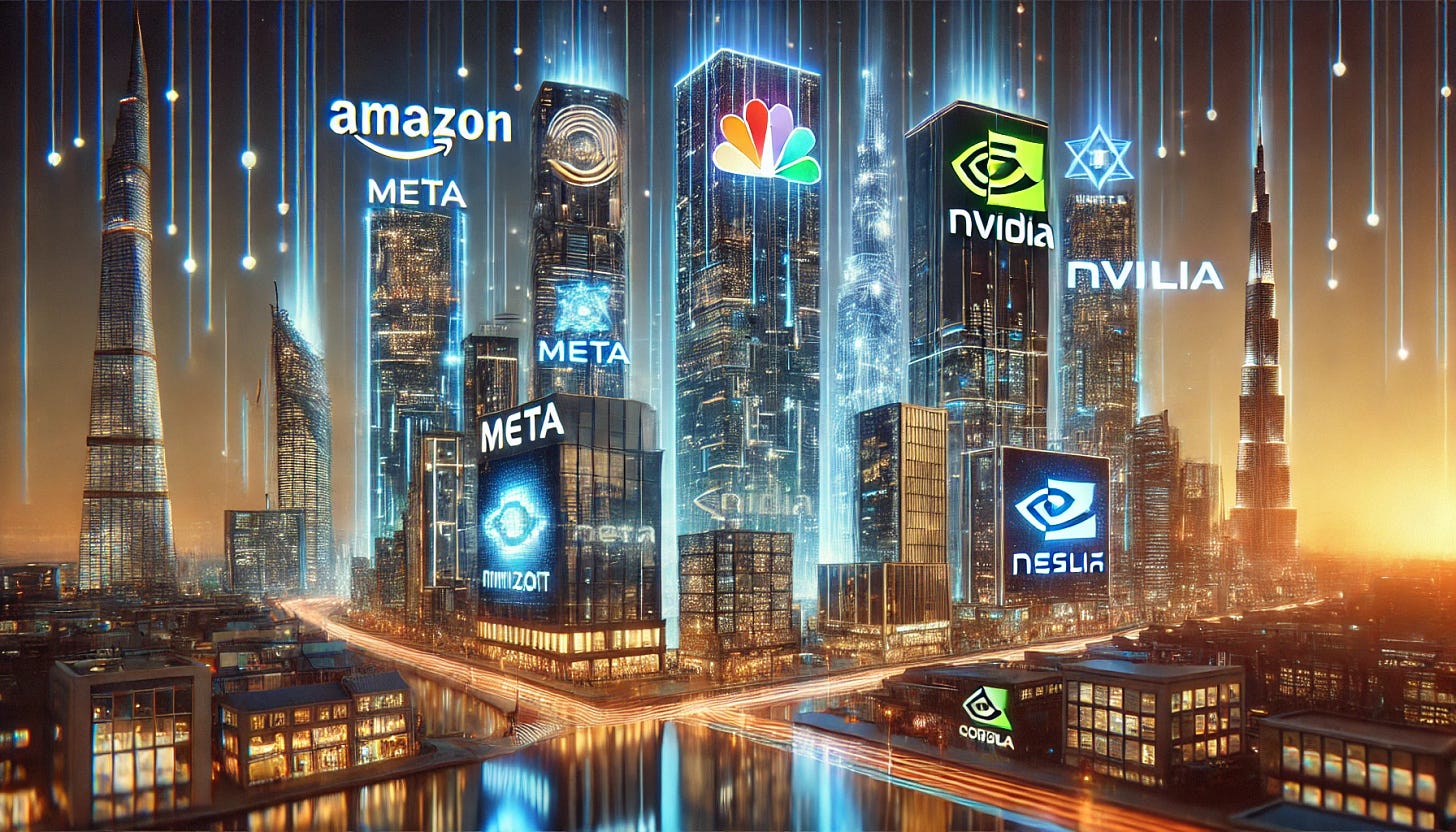Tech Titans in 2024: The Magnificent Seven and Their Capital Expenditure Surge on AI Infrastructure
Retail investors, while observing market favourites like Nvidia and Amazon with interest, should remain wary of overvalued bubbles that may arise from excessive enthusiasm or "irrational exuberance".
Big Tech’s Massive AI Investments: Spending at a National Scale
As we navigate through a transformative period in technology, the world's leading tech companies are not only reshaping industries but also pouring unprecedented levels of investment into future growth. The "Magnificent Seven" — Amazon, Meta, Apple, Microsoft, Google, Nvidia, and Tesla — continue to dominate the tech landscape, driving innovation, particularly in artificial intelligence (AI) and infrastructure. With staggering increases in capital expenditure, these companies are positioning themselves for an AI-driven future, though their diverse approaches underscore the varying pathways and risks associated with large-scale investments.
Amazon’s Exponential Capital Expenditure Growth
Amazon has made headlines with a colossal capital expenditure of $22.6 billion for Q3 of 2024, reflecting an 81% year-over-year increase. This investment primarily supports Amazon Web Services (AWS) infrastructure, including data centers and proprietary AI chips, aimed at meeting the burgeoning demand for cloud-based AI services. CEO Andy Jassy has also projected Amazon’s total capital spending for 2024 to reach an astonishing $75 billion, with an expectation to exceed this figure in 2025. The strategic focus on AI underpins Amazon's ambition to cement its leadership in cloud services, particularly as businesses increasingly depend on generative AI solutions.
Meta’s Capital Commitments and Reality Labs
Meta has also raised its capital expenditure projections, potentially reaching $40 billion by year-end. However, the broader implications of these investments, particularly in Meta's Reality Labs, are marked by challenges. Reality Labs has continued to operate at a loss — reportedly over $4 billion in Q3 of 2024 — as Meta pursues its vision of the metaverse, albeit with slower-than-anticipated traction. While Meta’s heavy investment underscores its commitment to next-gen digital experiences, scepticism remains over whether this gamble will eventually pay off in mainstream adoption and profitability.
Apple’s Strategy: Balancing Devices and Services
Apple's recent performance reflects a steady approach that balances growth in device sales — notably the iPhone 16, Apple Watch, and AirPods — with an increasing focus on services like Apple TV+ and iCloud. Apple's services now represent a significant portion of its revenue, and while its capital expenditure may not be as aggressive as Amazon's or Meta's, the company remains committed to incremental innovation and ecosystem expansion. This balanced approach aligns with Apple’s core philosophy of delivering polished, user-centric experiences that blend hardware, software, and services seamlessly.
Google’s AI-Driven Growth and Code Automation
Google, with its strategic pivot to AI, is also capitalising on the potential of generative AI in various applications, including code generation. Although precise numbers for Google’s AI-driven revenue aren't publicly detailed, it is reported that approximately 25% of Google's new code is generated by AI, showcasing the company’s forward-looking integration of AI in software development. While this automation could reduce costs and accelerate innovation, Google's overarching strategy also aligns with its expanding cloud and advertising services, where AI plays a pivotal role.
Future Capital Expenditure Trends: A Dual Path of Opportunity and Risk
With record-breaking expenditures across the tech giants, it is clear that capital outlay trends will persist into 2025. Amazon’s commitment to scaling AWS infrastructure suggests long-term faith in the cloud’s growth, while Meta’s spending reflects its enduring belief in the metaverse. Apple and Google, though more conservative, are also placing incremental bets on AI to enhance their product ecosystems and maintain competitive edges.
Summing Up
Our Honorary Tech Adviser, Bilawal Sidhu, offers a prudent perspective, advising, "It's not a sell on rise market but buy on dip... but don't try to catch falling knives." In the medium term, the Magnificent Seven continue to look buoyant, with their aggressive investments potentially paying dividends as AI and other advanced technologies become mainstream. However, there are "air pockets" — from regulatory pressures to potential tech bubbles — that could disrupt this upward trajectory. Retail investors, while observing these market favourites like Nvidia and Amazon with interest, should remain wary of overvalued bubbles that may arise from excessive enthusiasm. Savvy investors, in our opinion, would do well to book profits when prudent, balancing optimism with caution in an ever-evolving tech market.



Where does my India stand in this revolution. Are we still waiting for things to happen by themselves while patting our own shoulders for the achievement of west.